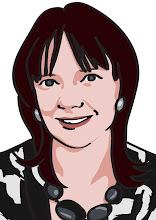 This is one of my favourite zen/taoist stories about how our thinking creates our problems:
This is one of my favourite zen/taoist stories about how our thinking creates our problems:There is a Taoist story of an old farmer who had worked his crops for many years. One day his horse ran away. Upon hearing the news, his neighbours came to visit.
"Such bad luck," they said sympathetically.
"We'll see," the farmer replied.
The next morning the horse returned, bringing with it three other wild horses.
"How wonderful," the neighbors exclaimed.
"We'll see," replied the old man.
The following day, his son tried to ride one of the untamed horses, was thrown, and broke his leg. The neighbors again came to offer their sympathy on his misfortune.
"We'll see," answered the farmer.
The day after, military officials came to the village to draft young men into the army. Seeing that the son's leg was broken, they passed him by. The neighbors congratulated the farmer on how well things had turned out.
"We'll see" said the farmer.
In saying 'we'll see' the farmer was demonstrating one of the core principles of yogic thinking: vairagya. Vairagya means non-reaction; if we are able to function from a state of vairagya we have a refined discriminating awareness that doesn't get 'caught up' in reacting and judging.
As Rudyard Kipling wrote in his famous poem, If:
If you can meet with Triumph and Disaster
And treat those two impostors just the same;
This is both a Buddhist and a yogic concept - of course, both have similar roots.












No comments:
Post a Comment